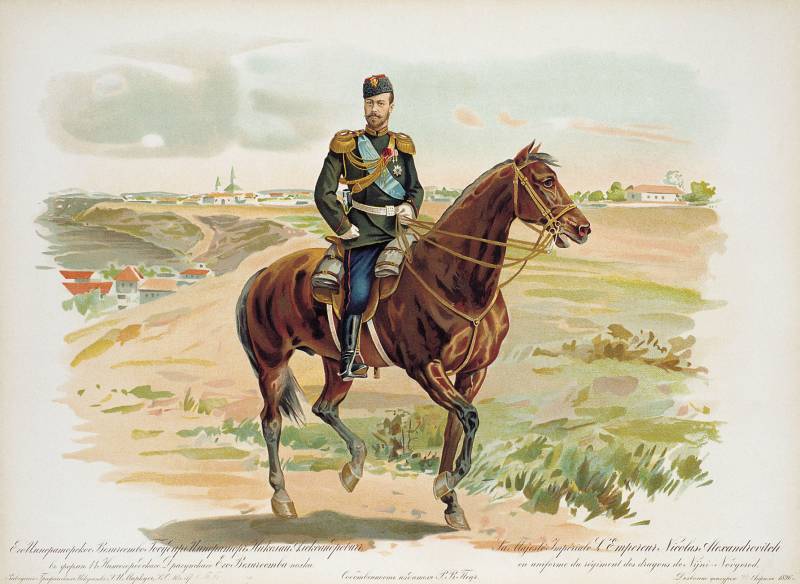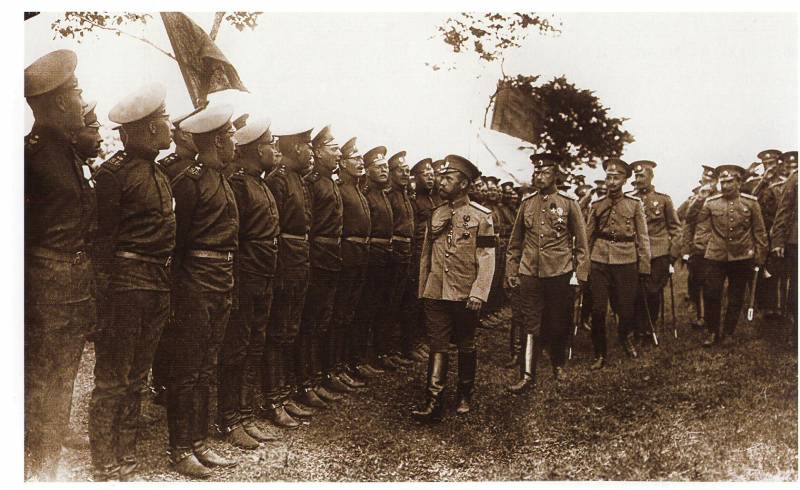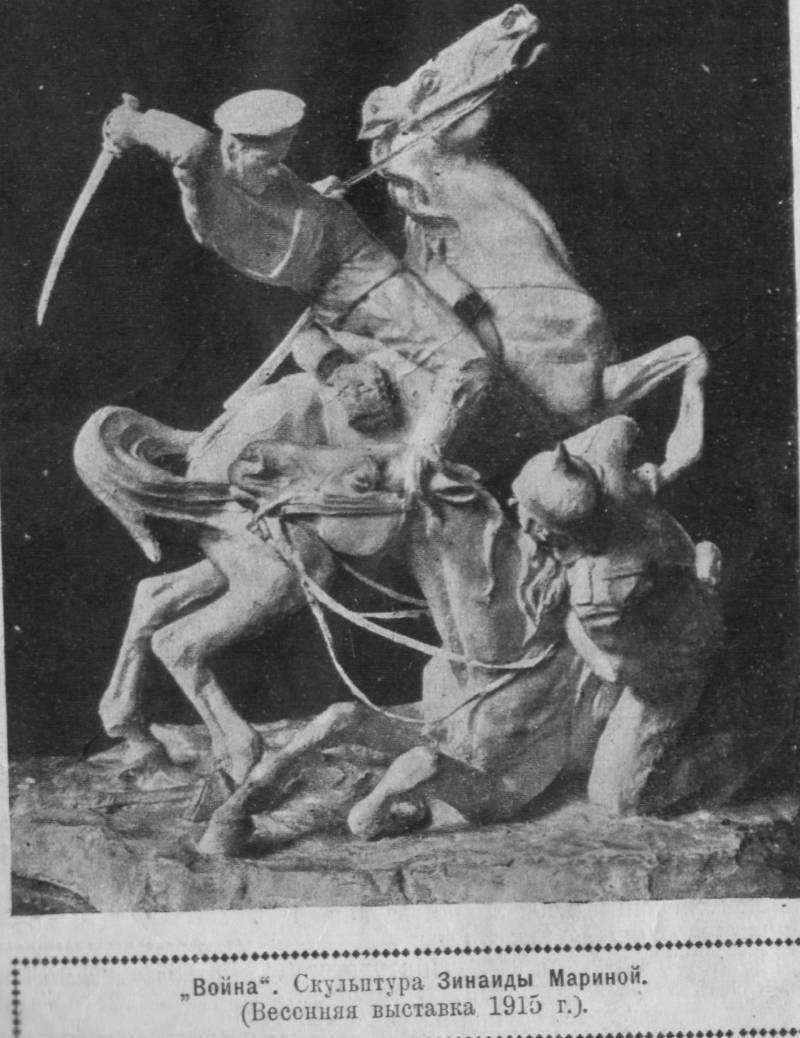Three Nizhny Novgorod attacks. Part of 1. Through the Saxon squadron
We want to tell about the first military campaign of the regiment during the First World War - conducted by the regiment on the Austro-German front and immediately marked by 3 attacks in the equestrian system
The Nizhny Novgorod Dragoon Regiment, as well as the Leib-Erivan and Georgian Grenadier Regiments, is one of the oldest in the Russian army. Being formed in 1701 by voivod P. M. Apraksin, during 200 years of military service, he performed such a mass of exploits that the Sovereigns practically exhausted, encouraging the regiment, the insignia established for military prowess. History Regiment - an exciting military epic, during which Nizhny Novgorod heroically fought during the Northern and Seven Years Wars, distinguished themselves during the Crimean campaigns and Russian-Turkish wars, participated in the Suvorov campaigns, the Russian-Persian war, conquered Chechnya and Dagestan, fought in the Crimea and Russian Turkish 1877-78 wars. Horse attacks Nizhny Novgorod have become the key to victory in many battles.
And Emperor Alexander III had every reason to say that he was happy and proud to wear the uniform of Nizhny Novgorod, which he was granted by his father, and believes that the dragoons will worthily carry the name of the Heir - the future Sovereign.
Emperor Nicholas II in the uniform of the 44 th (from 1907 g. - 17 th) of the Nizhny Novgorod Dragoon Regiment.
During the Great War, the Nizhny Novgorod Dragoon Regiment fought as part of the Caucasian Cavalry Division, both on the European and on the Turkish and Persian fronts.
And Nizhny Novgorod showed themselves worthy successors of the glory of their valiant ancestors.
Emperor Nicholas II conducts a review of the 17 th Dragoon Nizhny Novgorod Regiment, 1909-1910.
08. 08. 1914 in the battle of Skierniewice 5-th squadron of captain D. Prince 3. Chavchavadze conducted such a brilliant attack that the Supreme Commander Grand Prince Nikolai Nikolayevich reported her to the Emperor. The Main Command informed the Regimental Chief of the regiment about the destruction of the German reconnaissance squadron by Nizhny Novgorod.
What happened that day, becoming the object of close attention to the Glavkoverha?
3 August 1914. The 5 squadron was to march to Lovich, and the next day other regiment squadrons were to follow. It was assumed that all the regiments of the division were to be assembled in Lovich - but they were delayed in Skierniewice.
Early in the morning of August 8, a report was received that they were heading for Skierniewice to a squadron of German cavalry. And 5-th squadron of Nizhny Novgorod was ordered to speak along the railway line Skierniewitz-Petrokov and, finding the enemy, to attack. The 3 and 2 squadrons were to take part in the battle, while the remaining squadrons were to remain in Skierniewice.
Speaking in the indicated direction, Prince DZ Chavchavadze soon met a team of infantry scouts, during which there was a departure from the 4 squadron with Ensign Miroshnichenko. The latter reported that, according to information from the inhabitants, the enemy cavalry was moving along the railroad tracks - towards the 5 squadron. The prince continued to move in the platoon along the hollow of the same road, and Lieutenant Prince Bebutov with 10-th dragoons sent for reconnaissance in a southerly direction.
At about 13 hours, the right-wing non-commissioned officer, Rybnik, reported that an enemy had been spotted in a village north of the railway, who had opened fire on the sentry. The Germans could not see the squadron, since it was going through a hollow. Komesk, who was driving along the right knoll of the hollow and also noticing the enemy, gave a sign about building the front and led the squadron, bending it with his left shoulder, galloping in the direction of the shots. Seeing that the enemy was located behind the buildings, Chavchavadze hurried the squadron, but after a few minutes, noticing some uncertainty among the Germans (some of whom fired, and some mounted their horses), he again mounted his men on horses and commanded: “Follow me! March, march! ".
The squadron rushed forward - and suddenly found itself in front of a deep hollow of the railway. But it was impossible to stop the rush of the unit thrown into the attack. Despite the great steepness of the railway excavation, the squadron rushed down, found itself on the opposite side, and under enemy fire rushed to the village, to which there were still about half a kilometer. Chavchavadze took the direction to the left edge of the village and, jumping up to it first, stopped in front of a fence that suddenly grew before him - behind which he saw Germans who were gathering in groups who were preparing to fire at him point-blank. At that moment, Lieutenant-General of the squadron, Lieutenant Kozlov, who jumped the fence from a raid, rushed past the prince, broke into a bunch of Germans, and with the very first blow he chopped off one of their hands. The rest of the dragoons began to leap up, and the Germans, at a loss, began to partially mount their horses and flee into the field, and partially settled in houses and fired. The fate of the German squadron was resolved.
Leaving Captain Kozlov and the 4 platoon to beat the Germans out of their houses, Prince Chavchavadze, with the first half-squadron, rushed to pursue those who had fled - and many Germans were chopped up.
The scout lieutenant Prince Bebutov, hearing the shooting, immediately turned on the shots and joined the platoon of sergeant Kozlov, who drove the Germans out of the village.
Volunteer Count Fedor Medem, under whom a horse was killed at the beginning of the attack (he himself was easily wounded in the neck), realizing the screams of the Germans mounted their horses, reported to Prince Bebutov - and the prosecution began, during which also many enemy horsemen were hacked.
Returning from the chase, the commander ordered Count Medem to collect the wounded and killed Germans. The prisoners (including the wounded) turned out to be only 6, and those killed were about 60. In addition, 40 horses were captured.
During the battle in the village of non-commissioned officer Ferber, the commander of the German squadron, Major Earl Stolberg, was killed (he sat in a tree and watched a solar eclipse taking place that day). The fight turned around so quickly that the major did not have time to leave the tree. Valuable documents were found on the corpse, which revealed a whole espionage organization in Warsaw.
The prisoners showed that they were part of a special squadron, the task of which was to carry out important reconnaissance in the Warsaw area.
The loss of the Nizhny Novgorod squadron - 6 dragoons wounded (all injured - bullet), of which one soon died.
For this dashing affair the captain Prince Chavchavadze was awarded the St. George weaponsand the most distinguished - sergeant Kozlov, non-commissioned officers Pletnev, Makarov, Nemenko, Rybkin and the dragoon Anuchkin - with St. George's crosses.
The Supreme Commander, as noted, reported the case to the Sovereign by a telegram in which the following words were said: “70 selected German intelligence officers with an officer were met by a squadron of Nizhny Novgorod. Result: except for the 6 taken prisoners, all hacked up. Nizhny Novgorod - four wounded by bullets, two hard, with a single weapon no scratches. Adjutant General Nikolai.
07. 09. 1914 d. 1 Squadron commanded by Captain Lux under s. Blaski during the cavalry attack destroyed the squadron of the Saxon 21-th Uhlan Kaiser Wilhelm II of the King of Prussia - and under very exceptional conditions. The squadron lost only one person, but they became the gallant Komesk captain Lux.
How did this happen?
6 September 1914 Squadron of His Majesty, with a half-squadron of the 4-th squadron attached to it, went on reconnaissance in the direction of Blaski - Kalish.
Having sent four crossings in different directions (three officers under the command of Lieutenant Prince Kaplanov and the cornets of Khan Nakhchivansky and Panchulidzev and one non-commissioned officer under the command of non-commissioned officers Sivolapov), the squadron was located in the estate Volen. The squadron left the commander captain Lux, staff captain prince Golitsyn and lieutenant Volsky. Having set security, the officers began to have a snack. Suddenly, there was a tramp in the courtyard of the manor, and to Prince Golitsyn, who had run out into the courtyard, rode up on a soaked and bareback horse of some kind of peasant. He said that the German squadron had just passed through the village of Blaški, located in 2 km from the manor, in the direction of the city Sieradz. The peasant was a resident of s. Bashki, by the name of Göring, who had previously served as a trumpeter in the regiment - having noticed the German squadron that had passed through Blaški and knowing about the presence of the Russian squadron in the Volen estate, he hurried to do his duty. And what was the joy of the former trumpeter, when in those whom he rendered such a valuable service, he recognized his former colleagues. Goering made a squadron, and then was enlisted in the regiment - in the squadron of His Majesty.
The captain Lux, to cut off the enemy's retreat, led the squadron to the western outskirts of the village. Blashki, and then turned along the highway to Sieradz. In the squadron, minus the deported patrols, there remained about 60 people. Komesk sent a small detour out of three dragoons, commanded by non-commissioned officer Lyuft, to turn back and direct him to his squadron in case of a meeting with the enemy. When passing through Blaški residents confirmed the report about the passage of the German squadron.
On leaving Blashek, the highway passed between two rows of trees, often intertwining with each other branches forming green arches over the highway, thanks to which nothing could be seen farther than the 100 steps. In addition, ditches were dug on both sides of the highway.
The squadron moved in a column on 6, having at the head a squadron commander and staff captain Prince Golitsyn. Suddenly, in front of him, there was a horse trampling and revolving shots were heard. No sooner had the commander commanded "spikes on his shoulder ... checkers for battle ... march and march!" Seemed like a small trotter rushing towards the squadron, followed by a German squadron, with peaks at the ready, led by three officers.
From the side of the enemy, there were frantic “ho-x!” hoh! ”and the officers continuously fired from the parabellums at the raid sent (which was very careful) on the best horses of the regiment. Fascinated by the pursuit of the dragoons, the Germans did not expect such an unpleasant encounter and, at the sight of the Russian squadron, the victorious "hoch" quickly subsided. But it was too late to turn the German squadron, and nowhere. It remained to meet face to face - and try to break through the suddenly grown obstacle.
At the very first moment the commander of the German squadron killed Captain Lux. Almost at the same instant, the commander of the German squadron, who had jumped behind the staff captain of Prince Golitsyn, was killed by a mighty blow by his messenger Shevchenko. Subsequently, the through attack, which began at the quarry, turned into a slow creeping through each other of the two mounted masses head-on.
In this unusual fight, preponderance immediately became apparent on the side of the Russian dragoons, with powerful blows easily cut through by German helmets, while the Germans turned their heads helplessly, trying to defend themselves from all kinds of brutal blows. The platoon noncommissioned officer Luft cut the helmet of one German with a strong blow and cut his head, and the sword, slipping from his head, cut the horse’s croup.
As soon as the head of the squadron passed through the thick Germans, Captain Prince Golitsyn turned the squadron - and the merciless extermination of the fleeing enemy began, stopped only when the few surviving Germans scattered across the field, and in the distance, on the highway, German cyclists appeared. During the persecution, the junker Count Chernetsky, who fell with the horse, was captured, and one of the officers, who escaped with a help of two Jews to a guard booth and refused to surrender, was killed by the dragoon Nepomnyashchiy (as well as the two Jews who sheltered him). The commander of the German squadron, as stated above, was killed at the beginning of the attack. The lower ranks were hacked up by 70 people. 12 injured was captured. In the Russian squadron, the losses were small - 2 dragoon was wounded by bullets and a few - peaks. 7 horses killed and some more injured.
The reports received from the patrols spoke about the beginning of the German offensive in the direction of Sieradz. Therefore, sending the corps of the murdered captain Lux, wounded Germans and captured weapons, to the regiment headquarters, the squadron began to retreat to the guard station located in front of Sieradzi. Near der. Smardevo squadron stopped, taking the crossing - in anticipation of orders from the regimental headquarters.
It is impossible not to note several exceptional circumstances of this glorious business: 1) the sudden appearance of the former Nizhny Novgorod with a report about the enemy squadron that passed through his village - and the former dragoon once again served his own regiment; 2) a meeting in the equestrian duel of squadrons of two Chef regiments: His Majesty Nizhny Novgorod and William II of Uhlan; 3) the death of both commanders at the very beginning of the attack and 4) is extremely rare in military history through cavalry attack in a column of six - and on a narrow defile.
This case once again proved an advantage in the cavalry attack of the Russian cavalry over the enemy. Awareness of this superiority even more raised the spirit of the dragoons, who no longer doubted that in the melee - the victory was secured for them. And the German cavalry, having experienced powerful blows of the Russian cavalry in the very first days of the war, did not dare to enter into a horse-drawn duel with her and, at a meeting, dismounted or hid behind her infantry. Needless to say, the moral victory over the enemy’s cavalry was of great importance for the freedom of action of the Russian cavalry.
Turning to the first two savage attacks of Nizhny Novgorod - 5 th squadron of August 8 and His Majesty's squadron of September 7 - one can not but pay attention to the loyalty of training dragoons to combat work in the regiment. Without neglecting the other branches of training required by the cavalryman, the regiment paid special attention to chopping - in the realization that it was necessary for the success of the case that the equestrian fighter was confident of his superiority in hand-to-hand combat and, although it could be useful, most cases have to work with the sword. The regiment constantly hosted contests in the wheelhouse - both in squadrons and between squadrons and even between the regiments of the division (moreover, attention was paid not only to accuracy, but also to the force of the strike). Naturally, this bore fruit - and in the war there were bogatyr strikes, cutting through German helmets and skulls. And the regiment was rewarded for its peaceful work - glorifying himself with brilliant equestrian attacks on the German front of the Great War.
The ending should ...



Information